动词的三单形式变化规则
三单的变化规则
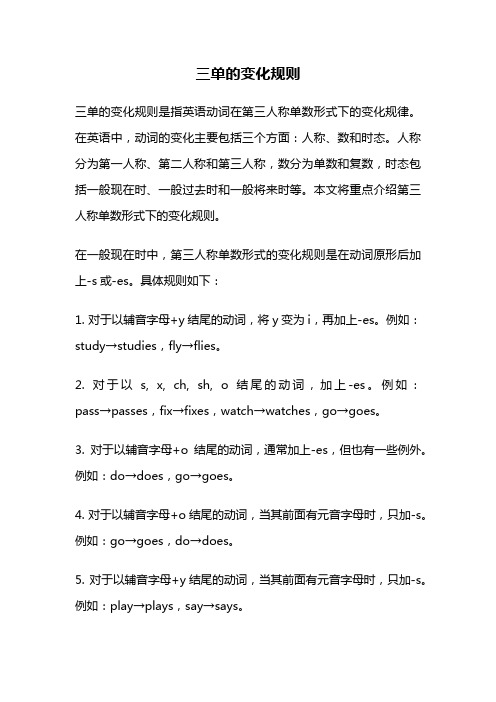
三单的变化规则三单的变化规则是指英语动词在第三人称单数形式下的变化规律。
在英语中,动词的变化主要包括三个方面:人称、数和时态。
人称分为第一人称、第二人称和第三人称,数分为单数和复数,时态包括一般现在时、一般过去时和一般将来时等。
本文将重点介绍第三人称单数形式下的变化规则。
在一般现在时中,第三人称单数形式的变化规则是在动词原形后加上-s或-es。
具体规则如下:1. 对于以辅音字母+y结尾的动词,将y变为i,再加上-es。
例如:study→studies,fly→flies。
2. 对于以s, x, ch, sh, o结尾的动词,加上-es。
例如:pass→passes,fix→fixes,watch→watches,go→goes。
3. 对于以辅音字母+o结尾的动词,通常加上-es,但也有一些例外。
例如:do→does,go→goes。
4. 对于以辅音字母+o结尾的动词,当其前面有元音字母时,只加-s。
例如:go→goes,do→does。
5. 对于以辅音字母+y结尾的动词,当其前面有元音字母时,只加-s。
例如:play→plays,say→says。
6. 对于以辅音字母+ch, sh, x结尾的动词,当其前面有元音字母时,只加-s。
例如:teach→teaches,wash→washes。
在一般过去时中,第三人称单数形式的变化规则是在动词原形后加上-ed或-d。
具体规则如下:1. 对于以辅音字母+e结尾的动词,直接加上-d。
例如:live→lived,hope→hoped。
2. 对于以重读闭音节结尾的动词,双写最后一个辅音字母,再加上-ed。
例如:stop→stopped,plan→planned。
3. 对于以辅音字母+y结尾的动词,将y变为i,再加上-ed。
例如:study→studied,carry→carried。
4. 对于以辅音字母结尾的动词,当其前面是元音字母时,双写最后一个辅音字母,再加上-ed。
(完整)动词第三人称单数变化规则如下
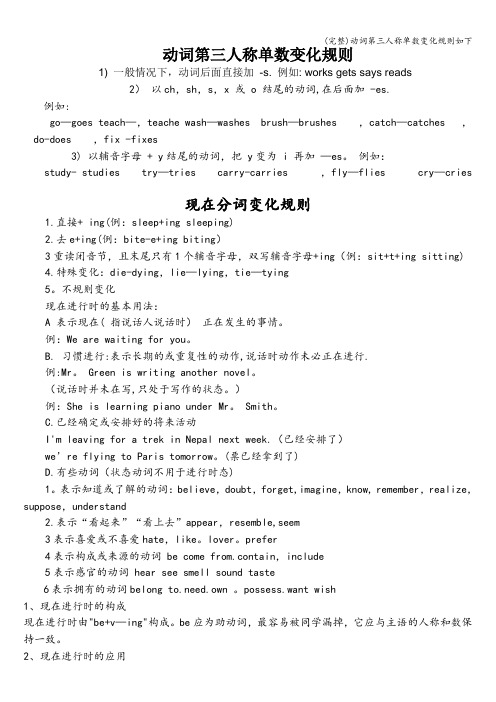
动词第三人称单数变化规则1) 一般情况下,动词后面直接加-s. 例如: works gets says reads2)以ch,sh,s,x 或 o 结尾的动词,在后面加 -es.例如:go—goes teach—,teache wash—washes brush—brushes ,catch—catches ,do-does ,fix -fixes3) 以辅音字母 + y结尾的动词,把 y变为 i 再加—es。
例如:study- studies try—tries carry-carries ,fly—flies cry—cries现在分词变化规则1.直接+ ing(例:sleep+ing sleeping)2.去e+ing(例:bite-e+ing biting)3重读闭音节,且末尾只有1个辅音字母,双写辅音字母+ing(例:sit+t+ing sitting)4.特殊变化:die-dying,lie—lying,tie—tying5。
不规则变化现在进行时的基本用法:A 表示现在( 指说话人说话时)正在发生的事情。
例:We are waiting for you。
B. 习惯进行:表示长期的或重复性的动作,说话时动作未必正在进行.例:Mr。
Green is writing another novel。
(说话时并未在写,只处于写作的状态。
)例:She is learning piano under Mr。
Smith。
C.已经确定或安排好的将来活动I'm leaving for a trek in Nepal next week.(已经安排了)we’re flying to Paris tomorrow。
(票已经拿到了)D.有些动词(状态动词不用于进行时态)1。
表示知道或了解的动词:believe,doubt,forget,imagine,know, remember,realize,suppose,understand2.表示“看起来”“看上去”appear,resemble,seem3表示喜爱或不喜爱hate,like。
动词三单变化规则及例子
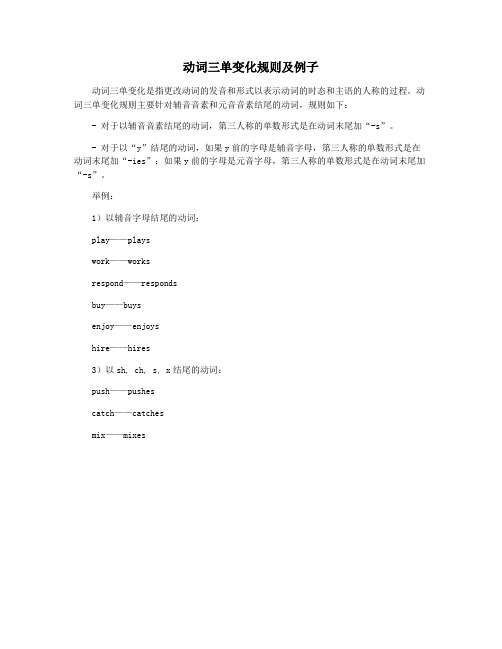
动词三单变化规则及例子
动词三单变化是指更改动词的发音和形式以表示动词的时态和主语的人称的过程。
动词三单变化规则主要针对辅音音素和元音音素结尾的动词,规则如下:
- 对于以辅音音素结尾的动词,第三人称的单数形式是在动词末尾加“-s”。
- 对于以“y”结尾的动词,如果y前的字母是辅音字母,第三人称的单数形式是在动词末尾加“-ies”;如果y前的字母是元音字母,第三人称的单数形式是在动词末尾加“-s”。
举例:
1)以辅音字母结尾的动词:
play——plays
work——works
respond——responds
buy——buys
enjoy——enjoys
hire——hires
3)以sh, ch, s, x结尾的动词:
push——pushes
catch——catches
mix——mixes。
动词的变化规则(动词三单,过去式,ing形式)
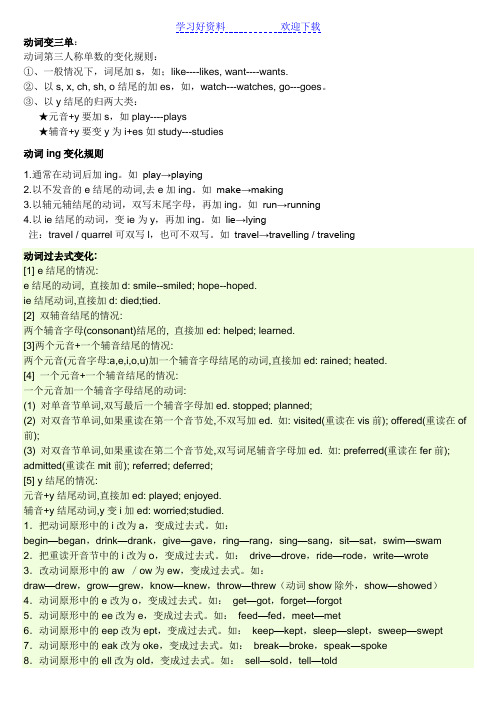
动词变三单:动词第三人称单数的变化规则:①、一般情况下,词尾加s,如;like----likes, want----wants.②、以s, x, ch, sh, o结尾的加es,如,watch---watches, go---goes。
③、以y结尾的归两大类:★元音+y要加s,如play----plays★辅音+y要变y为i+es如study---studies动词ing变化规则1.通常在动词后加ing。
如play→playing2.以不发音的e结尾的动词,去e加ing。
如make→making3.以辅元辅结尾的动词,双写末尾字母,再加ing。
如run→running4.以ie结尾的动词,变ie为y,再加ing。
如lie→lying注:travel / quarrel可双写l,也可不双写。
如travel→travelling / traveling动词过去式变化:[1] e结尾的情况:e结尾的动词, 直接加d: smile--smiled; hope--hoped.ie结尾动词,直接加d: died;tied.[2] 双辅音结尾的情况:两个辅音字母(consonant)结尾的, 直接加ed: helped; learned.[3]两个元音+一个辅音结尾的情况:两个元音(元音字母:a,e,i,o,u)加一个辅音字母结尾的动词,直接加ed: rained; heated.[4] 一个元音+一个辅音结尾的情况:一个元音加一个辅音字母结尾的动词:(1) 对单音节单词,双写最后一个辅音字母加ed. stopped; planned;(2) 对双音节单词,如果重读在第一个音节处,不双写加ed. 如: visited(重读在vis前); offered(重读在of 前);(3) 对双音节单词,如果重读在第二个音节处,双写词尾辅音字母加ed. 如: preferred(重读在fer前); admitted(重读在mit前); referred; deferred;[5] y结尾的情况:元音+y结尾动词,直接加ed: played; enjoyed.辅音+y结尾动词,y变i加ed: worried;studied.1.把动词原形中的i改为a,变成过去式。
动词三单的变化规则

动词三单的变化规则
动词的三单形式是指在第三人称单数主语(he、she、it)下的动词变化。
一般情况下,在动词三单形式中,动词要加-s、-es或-ies。
具体的变化规则如下:
1. 一般规则:大多数动词在第三人称单数时,直接在动词原形后添加-s。
例如:play → plays,talk → talks,run → runs。
2. 以-s、-ss、-sh、-ch、-x、-o结尾的动词:在这些动词的第三人称单数形式中,要在动词原形后添加-es。
例如:pass → passes,brush → brushes,wash → washes,watch → watches。
3. 以辅音字母+y结尾的动词:如果辅音字母y前面是元音字母,则直接在动词原形后添加-s。
例如:play → plays。
如果辅音字母y前面是辅音字母,则将y改为i,再加-es。
例如:carry → carries,study → studies。
4. 不规则变化的动词:有一些动词的第三人称单数形式变化不遵循以上规则,需要记忆这些不规则变化。
例如:be → is,have → has,do → does,go → goes。
需要注意的是,动词的三单形式还会受到时态、语气和语法结构等因素的影响,有时会发生变化。
因此,需要根据具体的语境来确定动词的变化形式。
动词的变化规则(动词三单,过去式,ing形式)
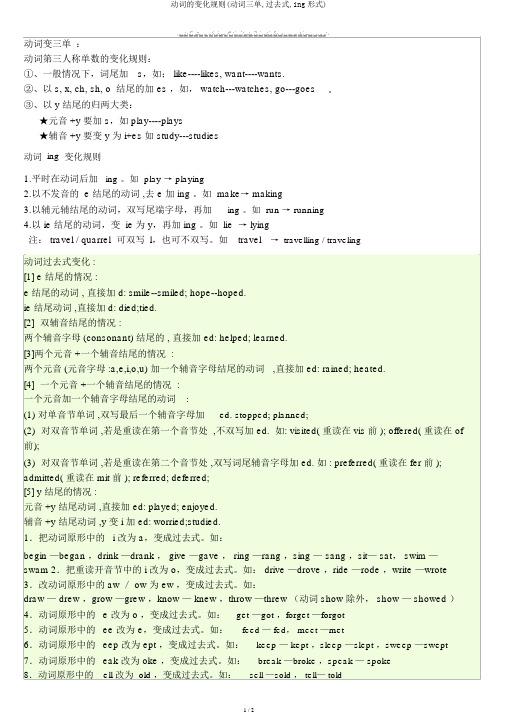
动词变三单:动词第三人称单数的变化规则:①、一般情况下,词尾加s,如; like----likes, want----wants.②、以 s, x, ch, sh, o 结尾的加 es ,如, watch---watches, go---goes。
③、以 y 结尾的归两大类:★元音 +y 要加 s,如 play----plays★辅音 +y 要变 y 为 i+es 如 study---studies动词ing变化规则1.平时在动词后加ing 。
如 play → playing2.以不发音的 e 结尾的动词 ,去 e 加 ing 。
如 make→ making3.以辅元辅结尾的动词,双写尾端字母,再加ing 。
如 run → running4.以 ie 结尾的动词,变 ie 为 y,再加 ing 。
如 lie → lying注: travel / quarrel可双写l,也可不双写。
如travel→ travelling / traveling动词过去式变化 :[1]e 结尾的情况 :e 结尾的动词 , 直接加 d: smile--smiled; hope--hoped.ie 结尾动词 ,直接加 d: died;tied.[2]双辅音结尾的情况 :两个辅音字母 (consonant) 结尾的 , 直接加 ed: helped; learned.[3]两个元音 +一个辅音结尾的情况 :两个元音 (元音字母 :a,e,i,o,u) 加一个辅音字母结尾的动词,直接加 ed: rained; heated.[4]一个元音 +一个辅音结尾的情况 :一个元音加一个辅音字母结尾的动词:(1) 对单音节单词 ,双写最后一个辅音字母加ed. stopped; planned;(2)对双音节单词 ,若是重读在第一个音节处 ,不双写加 ed. 如: visited( 重读在 vis 前 ); offered( 重读在 of 前);(3)对双音节单词 ,若是重读在第二个音节处 ,双写词尾辅音字母加 ed. 如 : preferred( 重读在 fer 前 ); admitted( 重读在 mit 前 ); referred; deferred;[5]y 结尾的情况 :元音 +y 结尾动词 ,直接加 ed: played; enjoyed.辅音 +y 结尾动词 ,y 变 i 加 ed: worried;studied.1.把动词原形中的i 改为 a,变成过去式。
动词三单变化规则表格

以下是动词第人称单数变化规则的表格:
规则类型
变化情况
1.动词原形
三单形式与原形相同
2.动词以-ch、-sh、-s、-x或-z结尾
在词尾加-es
3.动词以辅音+y结尾
将y改为i,再加-es
4.动词以-o结尾
如果动词是“to be”或“to have”,则三单形式不变;如果动词是其他动词,则通常在词尾加-es,但也有一些特殊情况,如“go”变为“goes”
5.情态动词
情态动词没有三单形式,但有些情态动词如“can”有时会有三单形式的变体,如“could”
6.助动词
助动词也没有三单形式,但有些助动词如“do”有时会有三单形式的变体,如“does”
请注意,这只是一般规则,有些特殊情况可能不完全符合这些规则。因此,建议查阅英语语法书或咨询英语教师以获得更准确的指导。
动词变单三的规则
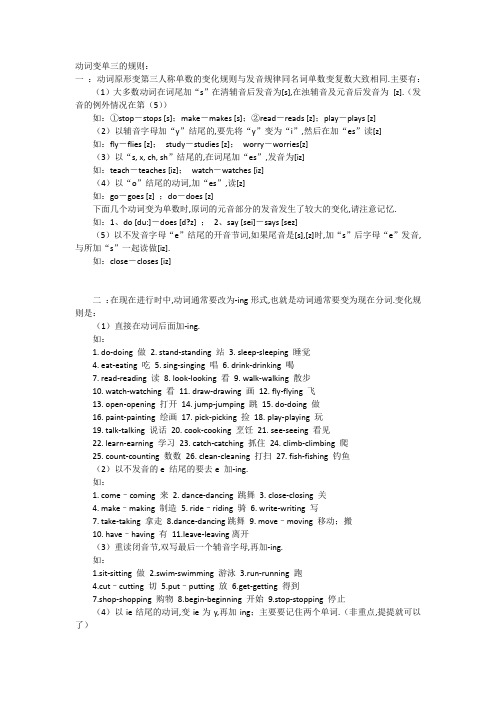
动词变单三的规则:一:动词原形变第三人称单数的变化规则与发音规律同名词单数变复数大致相同.主要有:(1)大多数动词在词尾加“s”在清辅音后发音为[s],在浊辅音及元音后发音为[z].(发音的例外情况在第(5))如:①stop-stops [s];make-makes [s];②read-reads [z];play-plays [z](2)以辅音字母加“y”结尾的,要先将“y”变为“i”,然后在加“es”读[z]如:fly-flies [z];study-studies [z];worry-worries[z](3)以“s, x, ch, sh”结尾的,在词尾加“es”,发音为[iz]如:teach-teaches [iz];watch-watches [iz](4)以“o”结尾的动词,加“es”,读[z]如:go-goes [z] ;do-does [z]下面几个动词变为单数时,原词的元音部分的发音发生了较大的变化,请注意记忆.如:1、do [du:]-does [d?z] ;2、say [sei]-says [sez](5)以不发音字母“e”结尾的开音节词,如果尾音是[s],[z]时,加“s”后字母“e”发音, 与所加“s”一起读做[iz].如:close-closes [iz]二:在现在进行时中,动词通常要改为-ing形式,也就是动词通常要变为现在分词.变化规则是:(1)直接在动词后面加-ing.如:1. do-doing 做2. stand-standing 站3. sleep-sleeping 睡觉4. eat-eating 吃5. sing-singing 唱6. drink-drinking 喝7. read-reading 读8. look-looking 看9. walk-walking 散步10. watch-watching 看11. draw-drawing 画12. fly-flying 飞13. open-opening 打开14. jump-jumping 跳15. do-doing 做16. paint-painting 绘画17. pick-picking 捡18. play-playing 玩19. talk-talking 说话20. cook-cooking 烹饪21. see-seeing 看见22. learn-earning 学习23. catch-catching 抓住24. climb-climbing 爬25. count-counting 数数26. clean-cleaning 打扫27. fish-fishing 钓鱼(2)以不发音的e 结尾的要去e 加-ing.如:1. come–coming 来2. dance-dancing 跳舞3. close-closing 关4. make–making 制造5. ride–riding 骑6. write-writing 写7. take-taking 拿走8.dance-dancing跳舞9. move–moving 移动;搬10. have–having 有11.leave-leaving离开(3)重读闭音节,双写最后一个辅音字母,再加-ing.如:1.sit-sitting 做2.swim-swimming 游泳3.run-running 跑4.cut–cutting 切5.put–putting 放6.get-getting 得到7.shop-shopping 购物8.begin-beginning 开始9.stop-stopping 停止(4)以ie结尾的动词,变ie为y,再加ing;主要要记住两个单词.(非重点,提提就可以了)lie-liying(说谎)die-dying(死亡)三:一般过去时主要体现在动词的形式要用过去式,动词又分为不规则动词和规则动词.其变化规则有:A.规则动词的过去式①一般是直接在动词的后面加ed;如:1.work-worked 工作 2.learn-learned 学习3.clean-cleaned 清洁4.visit-visited拜访,参观②以e结尾的动词直接加d;如:1.live-lived居住2.dance-danced 跳舞 e-used 使用③以辅音字母加y结尾的动词要改y为i再加ed(此类动词较少)如:1.study–studied 学习2.carry –carried 搬动 3.worry –worried担心而以元音字母加y结尾的动词的变化规则也是直接加ed如:play-played 玩stay-stayed 停留;依靠④双写最后一个字母(此类动词非常少)如:stop-stoppedB.不规则动词(此类词并无规则,须熟记)小学阶段要记住以下动词的原形和过去式(一下内容还是过多,有些比较少见):1.sing–sang唱歌2.eat–ate吃3.see–saw看4.have–had有5.do–did做6.go–went去7.take –took带走8.buy–bought买9.get–got到达10.read–read阅读11.fly–flew飞12.am/is –was 是,有13.are–were是,有14.say–said说15.leave–left离开16.swim–swam游泳17.tell–told告诉18.draw–drew 画画e–came来20.lose–lost失去21.find–found找到22.drink –drank喝23.hurt–hurt受伤24.feel–felt 感到25.put-put放置26.drive-drove开车27.write-wrote写28.win-won赢29.begin-began开始30.sit-sat坐31.give-gave给32.catch-caught抓住33.teach-taught教34.sleep-slept睡觉35.sweep-swept打扫36.know-knew 知道在记这些变化规则的时候要谨记的一个:单数形式后面加“s”或“es”,动名词和现在分词后面加“ing”,过去式后面一般加“ed。
动词的“三单”,ing,和过去式变化规则
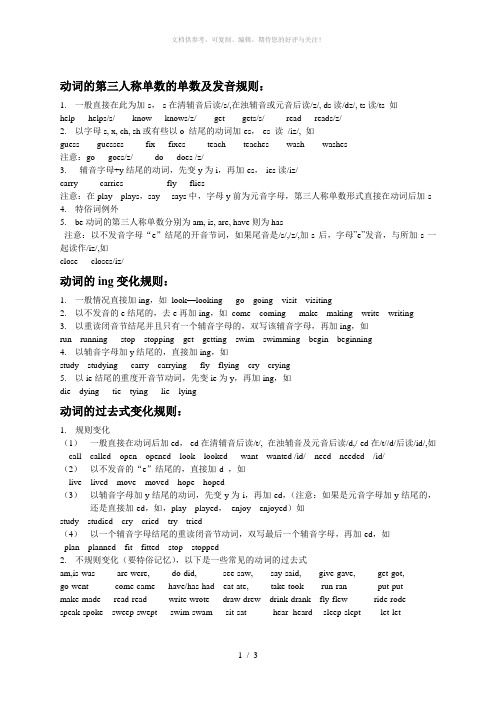
动词的第三人称单数的单数及发音规则:1.一般直接在此为加-s,-s在清辅音后读/s/,在浊辅音或元音后读/z/, ds读/dz/, ts读/ts 如help helps/s/ know knows/z/ get gets/s/ read reads/z/2.以字母s, x, ch, sh或有些以o 结尾的动词加-es,-es 读/iz/, 如guess guesses fix fixes teach teaches wash washes注意:go goes/z/ do does /z/3.辅音字母+y结尾的动词,先变y为i,再加-es,-ies读/iz/carry carries fly flies注意:在play---plays,say----says中,字母y前为元音字母,第三人称单数形式直接在动词后加-s4.特俗词例外5.be动词的第三人称单数分别为am, is, are, have则为has注意:以不发音字母“e”结尾的开音节词,如果尾音是/s/,/z/,加-s后,字母”e”发音,与所加-s一起读作/iz/,如close closes/iz/动词的ing变化规则:1.一般情况直接加ing,如look—looking go---going visit---visiting2.以不发音的e结尾的,去e再加ing,如come---coming make---making write---writing3.以重读闭音节结尾并且只有一个辅音字母的,双写该辅音字母,再加ing,如run---running stop---stopping get---getting swim---swimming begin---beginning4.以辅音字母加y结尾的,直接加ing,如study---studying carry---carrying fly---flying cry---crying5.以ie结尾的重度开音节动词,先变ie为y,再加ing,如die---dying tie---tying lie---lying动词的过去式变化规则:1.规则变化(1)一般直接在动词后加ed,-ed在清辅音后读/t/, 在浊辅音及元音后读/d,/-ed在/t//d/后读/id/,如call---called open---opened look---looked want---wanted /id/ need---needed /id/(2)以不发音的“e”结尾的,直接加-d ,如live---lived move---moved hope---hoped(3)以辅音字母加y结尾的动词,先变y为i,再加-ed,(注意:如果是元音字母加y结尾的,还是直接加-ed,如,play---played,enjoy---enjoyed)如study---studied cry---cried try---tried(4)以一个辅音字母结尾的重读闭音节动词,双写最后一个辅音字母,再加-ed,如plan---planned fit---fitted stop---stopped2.不规则变化(要特俗记忆),以下是一些常见的动词的过去式am,is-was are-were, do-did, see-saw, say-said, give-gave, get-got,go-went come-came have/has-had eat-ate, take-took run-ran put-putmake-made read-read write-wrote draw-drew drink-drank fly-flew ride-rode speak-spoke sweep-swept swim-swam sit-sat hear- heard sleep-slept let-letblow-blew hurt-hurt speak-spoke buy-bought keep-kept swim-swam eat-atecatch-caught know-knew stand-stood choose-chose lie-lay leave-left draw-drewteach –taught drink-drank make- made tell-told think-thought mean-meantfeel-felt drive-drove meet-met write –wrote find-found fly-flewforget -forgot ring -rang see -saw ride-rodegrow-grew sing-sang/sung begin-began learn-learned/learnt可数名词变复数的规则:1.规则变化:(1)一般情况下,在词尾加-s,如book---books boy---boys(2)以-s,-x,-ch,-sh结尾的名词,在词尾加-es,如bus---buses watch---watches(3)以辅音字母加y结尾的,变y为i,再加-es,如city---cities family---families(4)以-f或-fe结尾的分两类,一类直接加-s,另一类大多数情况下,将-f或-fe改为v,再加-es,如,roof---roofs belief---beliefs leaf---leaves life---lives knife---knives2.不规则变化(1)元音字母发生变化man---men tooth---teeth goose---geese(2)词尾变化child---children mouse---mice(3)单复数同形sheep---sheep deer---deer fish---fish另附清辅音与浊辅音:清辅音:[p] [t] [k] [f] [s] [θ] [∫] [ts] [t∫] [tr] [h]浊辅音:[b] [d] [g] [v] [z] [δ][з] [dz] [dз] [dr] [r]音节分为开音节和闭音节,3.开音节又分为相对开音节和绝对开音节(1)相对开音节:“以一个元音字母+一个辅音字母(r除外)+不发音的e”结尾的叫相对开音节。
三单动词变化规则
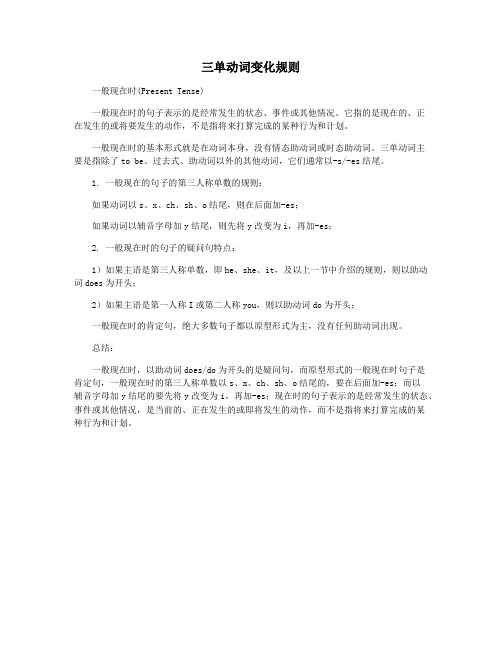
三单动词变化规则
一般现在时(Present Tense)
一般现在时的句子表示的是经常发生的状态、事件或其他情况。
它指的是现在的、正
在发生的或将要发生的动作,不是指将来打算完成的某种行为和计划。
一般现在时的基本形式就是在动词本身,没有情态助动词或时态助动词。
三单动词主
要是指除了to be、过去式、助动词以外的其他动词,它们通常以-s/-es结尾。
1. 一般现在的句子的第三人称单数的规则:
如果动词以s、x、ch、sh、o结尾,则在后面加-es;
如果动词以辅音字母加y结尾,则先将y改变为i,再加-es;
2. 一般现在时的句子的疑问句特点:
1)如果主语是第三人称单数,即he、she、it,及以上一节中介绍的规则,则以助动词does为开头;
2)如果主语是第一人称I或第二人称you,则以助动词do为开头;
一般现在时的肯定句,绝大多数句子都以原型形式为主,没有任何助动词出现。
总结:
一般现在时,以助动词does/do为开头的是疑问句,而原型形式的一般现在时句子是
肯定句,一般现在时的第三人称单数以s、x、ch、sh、o结尾的,要在后面加-es;而以
辅音字母加y结尾的要先将y改变为i,再加-es;现在时的句子表示的是经常发生的状态、事件或其他情况,是当前的、正在发生的或即将发生的动作,而不是指将来打算完成的某
种行为和计划。
动词《第三人称单数形式》的变化规则

小学英语动词第三人称单数变化规则一般现在时的肯定句中,主语为第三人称单数的动词变化主要体现在词尾的变化上,其规律为:1、变否定句:格式为doesn’t/does not + 动词原形,如:He goes to school at six in the morning. (变否定句)→He doesn't go to school at six in the morning.2、变一般疑问句:要借用助动词does,如:She goes home at five every day.→Does she go home at five every day?--- Yes, she does./No, she doesn’t.哪些主语是第三人称单数?除I、you之外的所有可数名词单数及不可数名词。
(he she it 个人名)例题引路:判断下列词语哪些是第三人称单数,是请打“√”不是请打“×”。
he ( ) we( ) she( ) they( )it ( ) Han Mei ( ) uncle Wang ( )the farmers( ) my mother( ) Linda( )Sally and Lucy( ) the dog( ) the cats( )1、写出下列动词的第三人称单数。
drink ________ go _______ stay ________ make ________ look _________ have_______ pass_______ carry _______ come________ watch________ plant_______ fly ________ study_______ brush________ teach________ 2、用括号内动词的适当形式填空。
1. He often ________(have) dinner at home.2. We _____________ (not watch) TV on Monday.3. Nick ___________ (not go) to the zoo on Sunday.4. ________ they __________ (like) the World Cup?5. What _________they often _________ (do) on Saturdays?6. _________ your parents _________ (read) newspapers every day?7. There ________(be) some water in the bottle.8. My aunt _______(look) after her baby carefully.9. The child often _______(watch) TV in the evening.10. Mike’s sister ________ (cook) nice food. I _______ (like) eating it very much. 21. _______ (do) your brother_______ (watch) TV in the evening? No, he_______ (not).3、选出正确的答案:1. She (like / likes) to play football.2. He (like / likes) drinking milk.3. I (like / likes) to watch TV.4. We (like / likes) to play badminton.5. They (like / likes) to sing songs.6. She (read / reads) books every day.7. He (play / plays) computer games every day.8. It (listen / listens) to the radio every day.9. Linda (draw / draws) pictures every day.10. Jane and Linda (play / plays) football every day.5、把下列句子变为否定句:1. We like playing football.2. Linda swims every day.3. They like playing games.4. My father reads newspaper in the evening.7、把下列句子变为疑问句,并做肯定和否定回答。
英语单三变化规则表

英语单三变化规则表在英语中,动词的单三变化规则是指动词在第三人称单数时变化的规则。
下面是英语单三变化规则表。
1. 一般情况下,动词加-s。
例如:- He walks to school every day.- She speaks French fluently.2. 如果动词以-s,-x,-sh,-ch或-o结尾,加-es。
例如:- He watches TV in the evening.- She fixes the computer when it breaks down.3. 如果动词以辅音字母+y结尾,变y为i再加-es。
例如:- He studies hard for his exams.- She tries her best to help others.4. 如果动词以元音字母+y结尾,加-s。
例如:- She buys a new dress for the party.- He enjoys playing basketball with his friends.5. 如果动词以辅音字母+o结尾,加-es。
例如:- He goes to bed early every night.- She does her homework before watching TV.6. 如果动词以元音字母+o结尾,加-s。
例如:- He plays the guitar very well.- She has a lot of hobbies.7. 如果动词以-s,-x,-sh,-ch或-o和辅音字母+y结尾,加-s。
例如:- He fixes the cars when they break down.- She watches the movies on weekends.以上就是英语单三变化规则表,希望对大家有所帮助。
记住这些规则,能够帮助你更加流利地运用英语。
第三人称加s或es的规则

第三人称加s或es的规则
一般情况下,动词在第三人称单数形式下需要加s或es。
具体规则如下:
1. 一般情况下,在动词原形(即第一人称单数和复数形式)基础上,在动词末尾加上s 或es。
例如:play →plays, watch →watches, go →goes。
2. 如果动词以“o”结尾,并且前面是元音字母,则加s;如果前面是辅音字母,则加es。
例如:do →does, go →goes, echo →echoes。
3. 如果动词以s、x、ch、sh结尾,则加es。
例如:wash →washes, fix →fixes, catch →catches。
4. 第三人称单数形式的be动词为is。
例如:He is a teacher.
此外,还有一些特殊情况需要注意,比如have在第三人称单数时要用has,动词go的第三人称单数形式为goes等。
总的来说,第三人称单数形式的动词加s或es遵循以上几个基本规则,需要根据不同的词形变化类别进行相应的变化。
- 1、下载文档前请自行甄别文档内容的完整性,平台不提供额外的编辑、内容补充、找答案等附加服务。
- 2、"仅部分预览"的文档,不可在线预览部分如存在完整性等问题,可反馈申请退款(可完整预览的文档不适用该条件!)。
- 3、如文档侵犯您的权益,请联系客服反馈,我们会尽快为您处理(人工客服工作时间:9:00-18:30)。
哪些主语是第三人称单数? 现归纳总结如下:
一、人称代词he, she, it 是第三人称单数。
如:
He likes watching TV. 他喜欢看电视。
He has lunch at twelve. 她十二点吃午餐。
It looks like a cat. 它看起来像只猫。
二、单个人名、地名或称呼作主语;是第三人称单数。
如:
①Han Mei looks like her mother. xx 看起来像她的母亲。
②Beijing is in China. xx 在xx。
③Un cle Wang often makes cakes. xx 叔叔经常做蛋糕。
三、单数可数名词或"this / that / the+ 单数可数名词"作主语时,是第三人称单数。
如:
①A horse is a useful ani mal. 马是有用的动物。
②This book is yours. 这本书是你的。
③That car is red. 那辆小汽车是红色的。
④The cat is Lucy's. 这只猫是露xx的。
四、不可数名词作主语时为第三人称单数。
如:
①The milk is in the glass. 牛奶在玻璃杯里。
②The bread is very small. 那面包很小。
动词的三单形式变化规则:
1.一般情况下,直接加-s
2.以s. x. sh. ch. o 结尾,加-es
3. 以“辅音字母+y ”结尾,变y 为i,再加-es
4. have 要变 has
般现在时用法专练 :
写出下列动词的第三人称单数 drink ___ ____ go
____ __ stay ____ __ make _ look _______ ____ have
____ ___ pass ___ ___ carry
_ come___ ____ watch__ ___ plant___ ___ fly
__ study ___ ___ brush ____________ ___ do ___________ ___ teach_
二、用括号内动词的适当形式填空。
1. He often _______ (have) dinner at home.
2. Daniel and Tommy _____ (be) in Class One.
3. We _____ (not watch) TV on Monday.
4. Nick ____ (not go) to the zoo on Sunday.
5. ____ they _______ (like) the World Cup?
6. What ______ they often ______ (do) on Saturdays?
7. _____ your parents ______ (read) newspapers every
day?
8. The girl ______ (teach) us English on Sundays.
9. She and I _______ (take) a walk together every evening.
10. There ______ (be) some water in the bottle.
11. Mike _____ (like) cooking.
12. They _____ (have) the same hobby.
13. My aunt ______ (look) after her baby carefully.
14. You always _____ (do) your homework well.
15. I _____ (be) ill. I 'm staying in bed.
16. She _____ (go) to school from Monday to Friday.
17. Liu Tao _____ (do) not like PE.
18. The child often _____ (watch) TV in the evening.
19. Su Hai and Su Yang ______ (have) eight lessons this term.
20. -What day ______ (be) it today?It 's Saturday.
三、按照要求改写句子
1. Daniel watches TV every evening.( 改为否定句)
2. I do my homework every day.( 改为一般疑问句,作否定回答)
3. She likes milk.( 改为一般疑问句,作肯定回答)
4. Amy likes playing computer games.( 改为一般疑问句,作否定回答)
改为否定句)
5. We go to school every morning.(
6. He speaks English very well.(改为否定句)
7. I like taking photos in the park.(对划线部分提问)
8. John comes from Canada.(对划线部分提问)
9. She is always a good student.(改为一般疑问句,作否定回答)
10. Simon and Daniel like going skating.(改为否定句)
四、改错(划出错误的地方,将正确的写在横线上)
1. Is your brother speak English? _________________
2. Does he likes going fishing? _________________
3. He likes play games after class. _________________
4. Mr. Wu teachs us English. _________________
5. She don't do her homeworkon Sundays. _________________。
